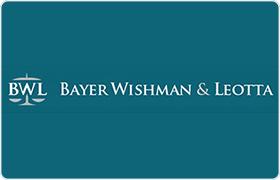Rowland Heights Reorganization Lawyer, California
Sponsored Law Firm
-
 x
x

Click For More Info:
-
Bayer Wishman & Leotta
1055 Wilshire Blvd Suite 1900 Los Angeles, CA 90017» view mapBankruptcy & Debt Experience, Affordability, & Expertise
The Los Angeles bankruptcy lawyers of Bayer Wishman & Leotta have successfully represented clients in the Los Angeles area for over 37 years. Bankruptcy is all we handle.
800-942-4591
Gregory Neil Morse
Real Estate, Wills & Probate, Reorganization, Bankruptcy
Status: In Good Standing Licensed: 32 Years
Daniel J. McCarthy
Corporate, Reorganization, Credit & Debt, Bankruptcy
Status: In Good Standing Licensed: 43 Years
 Leon Bayer Los Angeles, CA
Leon Bayer Los Angeles, CA Practice AreasExpertise
Practice AreasExpertise
